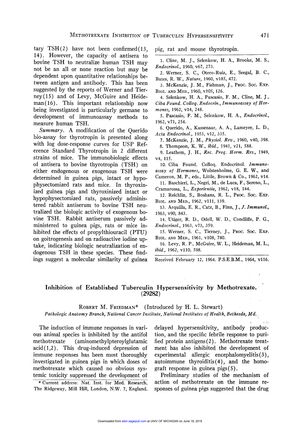Inhibition of Established Tuberculin Hypersensitivity by Methotrexate
June 1964
in “
Experimental Biology and Medicine
”

TLDR Methotrexate can temporarily suppress certain immune responses without killing immune cells, potentially helping treat autoimmune diseases.
In a 1964 study, researchers discovered that methotrexate could suppress established tuberculin hypersensitivity in Strain 2 guinea pigs within a short treatment period of 15 days. The suppression was not due to a decrease in circulating lymphocytes or a general anti-inflammatory effect. After cessation of methotrexate, tuberculin sensitivity returned within 10 days, indicating the effector cells' lifespan was less than 15 days. These findings suggest that drugs that suppress the immune response could be useful in treating autoimmune diseases associated with delayed hypersensitivity. Methotrexate appeared to inhibit cell multiplication rather than being directly cytotoxic and did not affect passively established, non-adoptive delayed hypersensitivity.